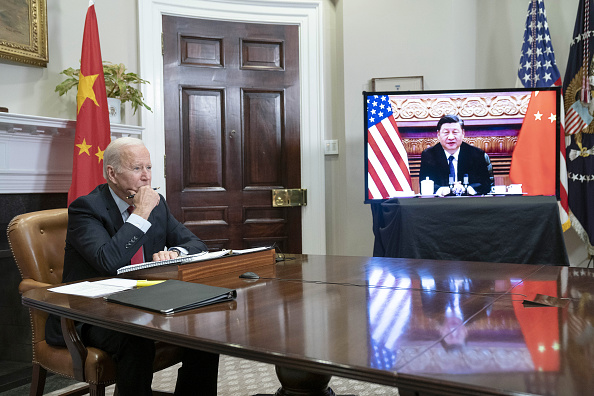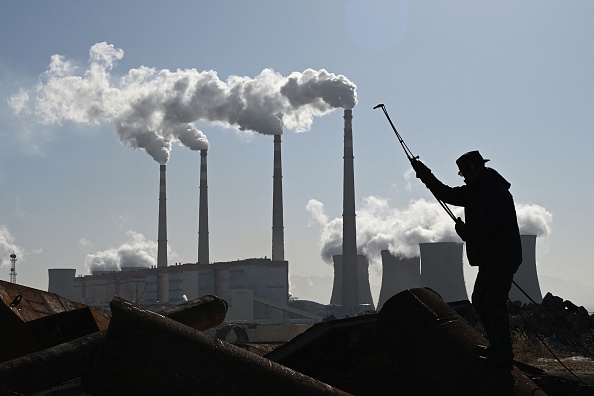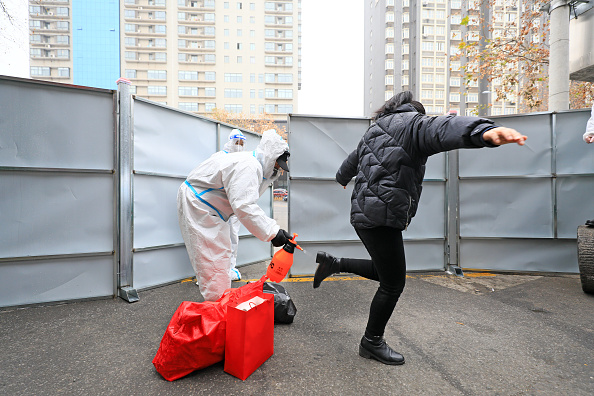
 The Dawn of a New Political Year
The Dawn of a New Political YearIt's a New Year, and 2022 is rife with both opportunities and challenges for the U.S.-China relationship. After simmering to a boiling point, tensions between the two sides eased enough in 2021 for Presidents Xi and Biden to hold a summit last month, held virtually because of COVID. And as China continues to pursue its zero-COVID policy, President Xi is doubling down on his plans for domestic reform.
"To realize the great rejuvenation of the Chinese nation will be no easy task like a walk in the park," Xi said in a brief New Year's Eve address broadcast to China's 1.4 billion residents. "We must always keep a long-term perspective, remain mindful of potential risks, maintain strategic focus and determination, and attain the broad and great while addressing the delicate and minute."
With a new tagline of the 'two establishments,' Beijing is hailing Xi as a 'core' leader with an established political doctrine. In 2022, Xi is likely to seek an unprecedented third term, at the culmination of the 20th National Congress.
The coming Winter Olympics in Beijing in February will be a significant opportunity for Beijing to project its image on the global stage, as it aims for the games to serve as a sign of another major Chinese accomplishment. But, in December, the U.S. announced a diplomatic boycott of the Beijing Winter Olympics over allegations of human rights abuses. While U.S. athletes will still participate, the Biden administration will not send any official representation to the games. China's foreign ministry condemned the move calling it a "travesty of the Olympic spirit," and said Beijing will take necessary and resolute countermeasures.
Read more in "2022: Turning the Page," by He Weiwen, a Senior Fellow at Chongyang Institute for Financial Studies.
 Climate Crunch
Climate CrunchBeijing met its own national air quality standards for the first time last year, following an effort to cut coal consumption, reduce transportation emissions and relocate heavy industry. As thousands of visitors prepare to arrive in Beijing for the Winter Olympics, Beijing's concentration of fine particulate matter has fallen 63% from 2013 levels, though it remains almost seven times the WHO-recommended levels. In 2015, Beijing said that the Winter Olympics in 2022 would help drive improvements in its environment, and Chinese President Xi Jinping promised to host a "green" Games.
As climate change increasingly becomes a reality, China faced record high temperatures and more extreme weather in 2021. Last year was China's hottest on record, according to the national weather service, registering an average increase of one degree higher than normal in recent years and the highest since 1961.
Climate change and extreme weather events are likely to present ongoing challenges for global supply chains in the coming years. In 2021, the closure of coal plants in China created an enormous energy crisis, threatening to slow the country's vast economy and place even more strain on global supply chains. As extreme weather becomes a more frequent phenomenon, businesses are bracing for impact as they anticipate confronting problems caused by shortages and global shipping delays.
Read more in "Making Sense of the Buzz: What Does 'U.S.-China Climate Cooperation' Actually Mean?," by Matt Geraci, a Research Associate at the Institute for China-America Studies (ICAS) and Manager at the ICAS Maritime Affairs Program.
 The Third Year
The Third YearThe new Covid-19 variant, Omicron, is rapidly taking the world by storm, as 2022 ushers society into the third year of the global pandemic. With global Covid-19 cases officially topping 300 million during the Omicron surge, along with reports of many countries missing their 2021 vaccination targets, there is an emerging spotlight on inconsistent protection measures and vaccine inequity worldwide. Meanwhile, China is pushing forward in their zero-tolerance Covid-19 strategy, leading to fewer Covid case reports overall, but resulting in a weary population and thrusting tension on an already strained global supply chain.
Lockdowns in some of China's largest cities, including Xi'an, are prompting fears about global industry disruption. Xi'an has been locked down since December 22, the longest lockdown in the nation since the Wuhan shutdown in the early days of the pandemic. While Xi'an is more well-known for its historical significance to China, it's also a notable manufacturing city, consisting of factories making auto parts, processor chips for smartphones, and goods for both domestic and global brands. Samsung Electronics and Micron Technologies said their Xi'an factories have already been affected and some deliveries might be delayed, though they're working to minimize disruption. Further south in China, authorities have also suspended access to parts of Ningbo, one of the world's busiest ports. This is decelerating freight handling, which economists say could lead to even higher shipping costs.
In the United States, where Covid-19 hospitalizations are poised to hit a record high this week, local economies continue to take a hit as the Omicron surge has increased food and supply shortages. SpartanNash, a grocery distributor in the U.S., said it has become harder to get supplies from food manufacturers. There have also been signs of declining productivity in other food sectors with inspectors calling in sick. Meanwhile, an increasing divide over vaccination mandates and Covid-19 measures in the U.S. continues to cast a shadow on any kind of end to the pandemic, and simultaneously has encouraged Beijing in its system of governance and zero-Covid approach.
Prepared by China-US Focus editorial teams in Hong Kong and New York, this weekly newsletter offers you snap shots of latest trends and developments emerging from China every week, while adding a dose of historical perspective.
- 2021-12-17 Clamp Down
- 2021-12-10 Debating Democracy
- 2021-12-03 Managing Competition
- 2021-11-19 Responsible World Leadership
- 2021-11-12 A Historic Transformation
- 2021-11-05 A Green Rivalry
- 2021-10-29 Dry Tinder
- 2021-10-22 A Diplomatic Burn
- 2021-10-15 Energy Crunch
- 2021-10-08 Stoking Tensions
- 2021-10-01 Great Power Coopetition
- 2021-09-24 Sign of Goodwill?
- 2021-09-17 State of Play
- 2021-09-10 The Last Word
- 2021-09-03 Heightened Frustrations
- 2021-08-27 China’s Backyard
- 2021-08-20 Graveyard of Empires
- 2021-08-13 A New Crossroads
